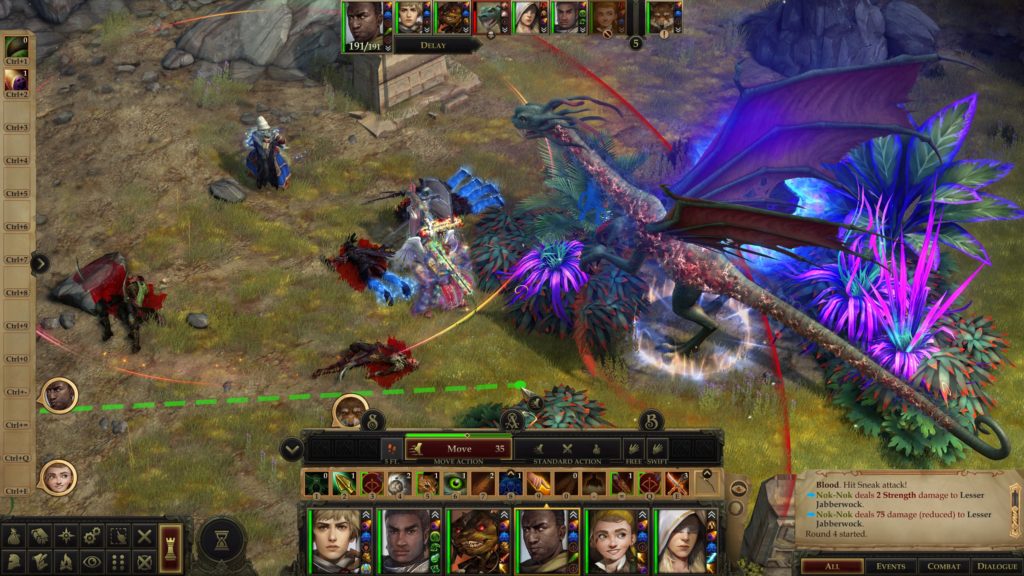
This game sucked up way too much of my life recently, taking far more time to complete than I expected and completely messing up my schedule. This is of course the famous videogame adaptation of the Pathfinder rules, itself descended from the old Dungeons & Dragons rules. Like everyone else in my generation, one of my fondest gaming memories were about playing the Baldur’s Gate series so of course I wanted more of that gaming magic made to modern standards. Even better, it now officially supports turn-based combat so I can take my time micro-managing every action for maximum optimization.
It turns out this may have been what I thought I wanted but I didn’t really want it after trying it for a while because this has been a pretty horrible experience all around, even though I powered through to the end out of stubbornness. (Disclaimer: I bugged out with the normal ending, instead of opting for the secret, super-hard ending.) It’s one thing to enjoy the D&D ruleset when there were few other alternatives and I concede that who play the pencil-and-paper like it well enough, and now that I’m older and have experienced more other videos, I think it’s just terrible for a video game due to how much more combat there needs to be in one. Especially early on, characters just keep missing attacks, round after round after round, and a single lucky hit may be just what it takes to kill an enemy, or your character. Then there’s the highly binary nature of the saving rolls. Granted, there are few outright save or die events now, but there are so many debilitating status effects like fear and paralyzed that are as good as being dead. Anyway I’ll talk a bit about the setting and story before coming back to the rules and gameplay mechanics.
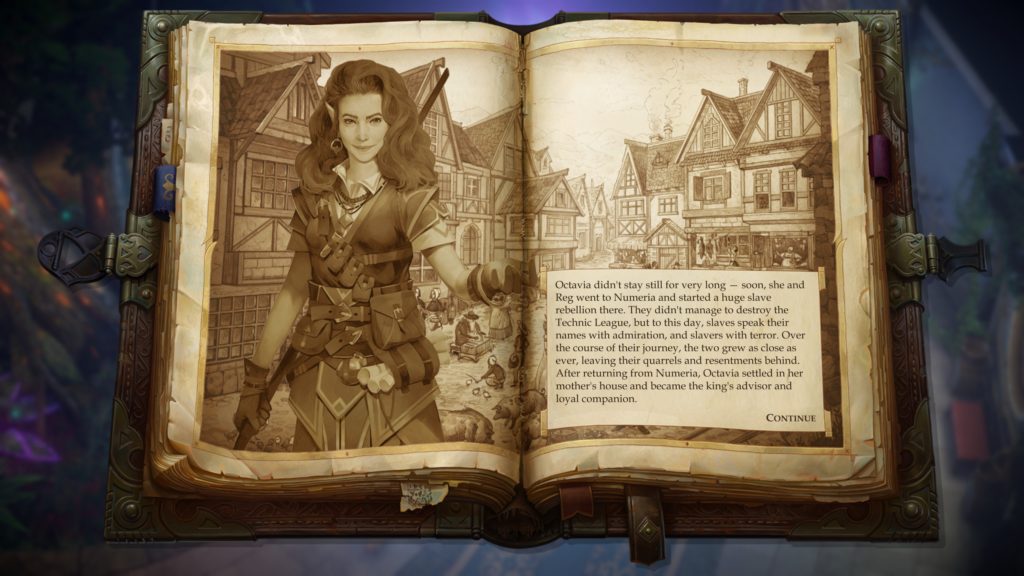
The story has the player being part of a group of adventurers being gathered to bring order to a lawless land, beginning with taking down a bandit lord. The reward for this is no less than to be the ruler of these lands and so this game expands upon one of the most interesting bits of those old RPGs: you actually do get a fully-fledged kingdom simulator here as well. The main quests are all about dealing with threats against your newly formed kingdom, in particular the machinations of an ancient being who has destroyed countless other kingdoms that have tried to settle these lands. In between adventuring about on the overland map, you’re expected to periodically return to your capital to make important decisions, assign advisors to different tasks, build up your villages and towns, and expand your kingdom.
One major difference that this makes, compared to other RPGs, is that the passing of time now matters. When events that concern your kingdom pop up, you have a limited window of time to deal with them, and ignoring them means automatically failing that event, causing your kingdom’s stats to drop. You can actually remote manage your kingdom while not in the capital so long as you remain within your own territory but you do need to physically return to the capital for some meetings. The upshot is that travelling overland uses time, as does resting or hunting for food before you can rest. Scheduled events as part of the main quests are timed too I believe and it is possible to lose the game due to running out of time to address important crises, so this is definitely a game with time pressure. Many actions in the kingdom management screen takes time too. Upgrading one of the kingdom’s stats for example, something that you’ll do over and over again, takes two weeks of in-game time. This also means that choosing to rest in order to renew your spells isn’t exactly a casual decision as it all costs time.
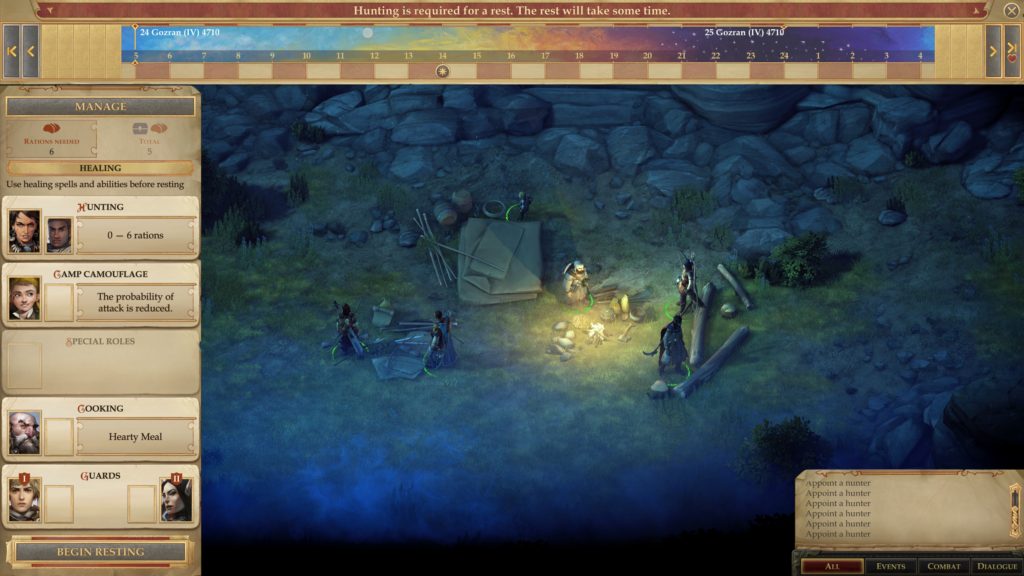
Unfortunately you will have to rest quite often in this game. At first it’s because you have so few uses of your special abilities, even your bard will run out of songs very quickly. Somewhere around the middle of the game, your party will feel powerful enough to take on multiple fights without resting in between. But towards the end of the game, the difficulty ramps up considerably and every party member will need to have a set of buffs constantly on in order to even be in the running. Freedom of Movement is an absolute must to cope with the never-ending attempts to paralyze and you need some way to deal with fear as well. Then there are the swarms which are nearly immune to all but area of effect attacks and deal damage to ability scores, the golems which have crazy immunities to almost everything, and so on. Part of the main story involves trolls which have their vulnerability to fire removed so you need acid to permanently put them down. But there are even monsters that cannot be killed unless you have a source of negative energy damage. Who even packs that as part of the repertoire of a normal party? That’s why you’d likely need to rest a lot to optimize your loadout for specific threats.
Due to the need to rigorously adhere to the Pathfinder rules, the game lacks any kind of threat generation mechanism so all you can do is make sure your tank character walks in front to get the attention of the enemies and hope they stay on him or her. The extremely binary nature of the rules makes things feel arbitrary and random throughout the entire game. One endgame boss for example can be dealt with a single Baleful Polymorph, if you’re lucky. A mid-game boss does so much damage on a critical hit that he can kill the toughest tank you can build in one hit. But he can also be trivialized with a lucky cast of Hideous Laughter or something similar. It just doesn’t make for a very satisfying game to me. What’s worse is that in-game information on some enemies and effect interactions are incomplete so you have to do a lot of trial and error to find out what works. Just go online to find the many questions on game mechanics. Having a character turned to stone is something that is incredibly difficult. In many cases, players simply suggest installing a mod to cheat your way past some problems.
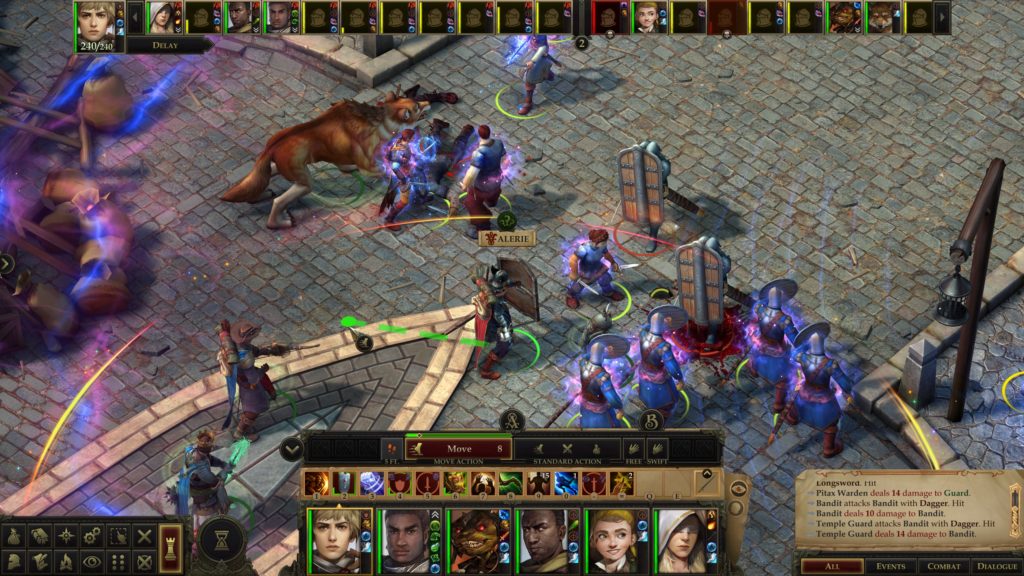
As if all that isn’t bad enough, this game is obnoxious in actively trying to waste as much of the player’s time as possible. With no modern-style quest markers to point you to where you need to go, you often need to manually scour a map to find a point of interest. The overland map will quickly become jam-packed with sites of interest and trying to find the one particular place that is named in a quest is a pain. You’ll soon wish you had a search bar or just resort to looking it up the web. At some points during the main quest, you may even be quite lost as to where you’re supposed to go next and need to resort to randomly wandering and hope you get lucky Perception rolls to spot the site you need to get to. Inventory management is tortuous. Certain types of vendor junk stack, others don’t and there is way too much of it. Quest items are not specially separated so you can accidentally sell them. If you use a healing potion from the toolbar, it isn’t automatically refilled from the inventory, making for example drinking a dozen potions of Cure Light Wounds tedious. There are just so many annoying user interface issues just because this game wants to be as close as possible to the old Infinity Engine games and so doesn’t implement the many quality of life features that have developed in the meantime. The method for getting the priest in your capital for example to cast for you the healing scrolls you can buy from him is so abstruse.
Finally the main story is okay enough even if parts are silly. Why for example doesn’t the king of Pitax deploy his army to block you from reaching his capital? Instead you’re free to walk right up to his palace and start assaulting it. But the stories for your companions are terrible and I found it unconscionable how absolutely rigid they are. If you want to keep your companions at the end you must complete their quests in a specific way and this always means taking the good path. I suppose that’s why they make it so easy to recruit generic NPCs you can customize yourself because it’s likely you’re going to need them. I also disliked how building up your towns and such actually have very little effect on gameplay. It’s very useful to build teleportation circles in them so you can quickly traverse the map at will but all of the other buildings only serve to boost your kingdom’s stats and those basically only act as hit points for the kingdom. It’s so silly how much effort they put into systems that in the end don’t matter much at all.
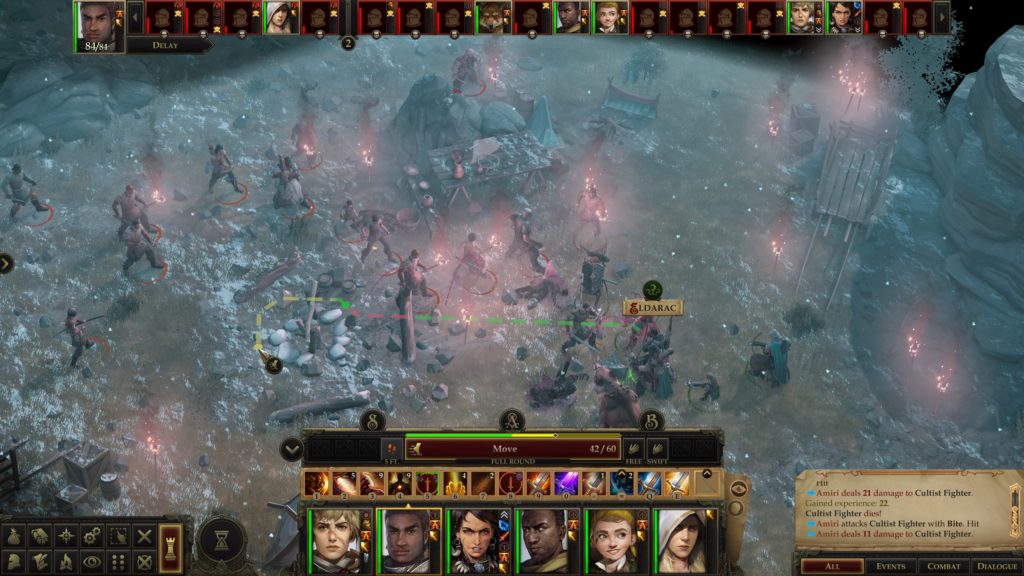
Anyway I am so very glad to be done with this game. It certainly satisfies my curiosity about what a modern Baldur’s Gate would be like and I learned that I want no part of it. I didn’t like Pillars of Eternity that much but it’s still far, far more preferable than this, not least because its more modern ruleset is more suited for a video game. This was a horrible experience and indeed is still janky in some ways, especially in its turn-based mode. I recommend staying as far away from this pointless time-waster as you can.